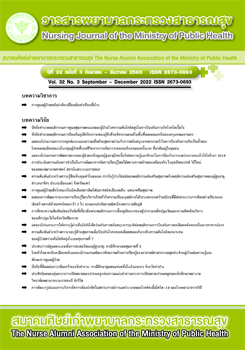Needs Assessment for the Development of Simulation - Based Learning in the Era of the New Normal Society of the Faculty of Nursing, Praboromarajchanok Institute.
Main Article Content
Abstract
The objectives of this study were to: 1) explore the situation, problems, and needs in developing simulation-based learning (SBL) in the era of the new normal society, 2) prioritize needs, and 3) provide recommendations for SBL development. The sample consisted of 24 administrators or heads of simulation learning centers in a nursing college and 300 nursing instructors of the faculty of nursing, Praboromarajchanok Institute. The research tools included questionnaires and a focus group interview guide. Data were analyzed using descriptive statistics, a modified priority needs index technique, and content analysis. The results revealed that: 1) The average scores of the needs for SBL development related to the actual and expected situation of the learning support subscale yielded a moderate level ( X =3.07, SD=1.03) and a high level ( X =4.32, SD=.95), respectively. 2) The need for SBL development was prioritized from learning facility support, following by management, and instructor development, respectively, and 3) Three major areas of SBL development included: recruiting a simulation lab technician to support learning management, developing a simulation-scenario bank, and placing budget support for simulation-based learning development. The findings of this study suggest that the administrators should urgently support learning facilities, learning management, and instructor development by establishing a clear support policy, allocating budget for learning facilities, establishing a simulation-lab technician position, and arranging nurse instructors’ training and development.
Article Details

This work is licensed under a Creative Commons Attribution-NonCommercial-NoDerivatives 4.0 International License.
บทความและรายงานวิจัยในวารสารพยาบาลกระทรวงสาธารณสุข เป็นความคิดเห็นของ ผู้เขียน มิใช่ของคณะผู้จัดทำ และมิใช่ความรับผิดชอบของสมาคมศิษย์เก่าพยาบาลกระทรวงสาธารณสุข ซึ่งสามารถนำไปอ้างอิงได้
References
Chaleoykitti S, Artsanthia J, Daodee, M S. The effect of COVID-19 disease: teaching and learning in nursing. Journal of Health and Nursing Research 2020;36(2):255-62.(in Thai)
Lateef F, Suppiah M, Chandra S, Yi TX, Darmawan W, Peckler B, et al. Simulation centers and simulation-based education during the time of COVID 19: A multi-center best practice position paper by the world academic council of emergency medicine. J Emerg Trauma Shock 2021;14(1):3-13.
Cordeau MA. (2013). Teaching holistic nursing using clinical simulation: a pedagogical essay. Journal
of Nursing Education and Practice 2013;3(4):40-50.
Lateef F. Maximizing learning and creativity: understanding psychological safety in simulation-based learning. J Emerg Trauma Shock 2020;13:5–14.
Luctker-Flude M, Wilson-Keates B, Larocque M. Evaluating high-fidelity human simulators and standardized patients in undergraduate nursing health assessment course. Nursing Education Today [internet].2012[2012 May 32]. Available: http://dx.doi.org/10.1016/j. nedt.2011.04.011.
Suwannakeeree W, Jullmusi O, Tangkawanich T. Simulation-based learning management for nursing students. Journal of Nursing Science Chulalongkorn University 2016;28(2):1-14.(in Thai)
Jeffries PR. A framework for designing, implementing, and evaluating: simulations used as teaching strategies in nursing. Nursing Education Perspectives 2005;26(2):96-103.
Kanhadilok S, Punsumreung T. Simulation based learning: design for nursing education. Journal of Nursing and Education 2016;9(1):1-14.(in Thai)
Wongwanich S. Needs assessment research. 3rd ed. Revised edition. Bangkok: Chulalongkorn Univerity Press;2015.(in Thai)
Yamane T. Statistics: an introductory analysis. New York: Harper & Row; 1973.
Tanasansutee C, Lertlum L, Panawatthanapisuit S. The development of an instructional skill using simulation based learning. Journal of Boromarajonani College of Nursing, Surin 2019;9(2):55-70.(in Thai)
Khamwong M, Kunlaka S, Sirimai W, Noochusuk C. Effect of simulation-based learning on self-confidence in therapeutic communication practice of nursing students. Journal of Health and Nursing Research
;36(1):201-12.(in Thai)
Sinthuchai S, Ubolwan K, Boonsin S. Effects of high-fidelity simulation based learning on knowledge, satisfaction, and self-confidence among the fourth year nursing students in comprehensive nursing care practicum. Rama Nurse Journal 2017;23(1):113-27.(in Thai)
Fogg N, Wilson C, Trinka M, Campbell R, Thomson A, Merrit L, et al. Transitioning from direct care to virtual clinical experiences during the COVID-19 pandemic. Journal of Professional Nursing 2020.Doi: https://doi.org/10.1016/j.profnurs.2020.09.012.
Klinchat R, Eiu-Seeyok B, Namwong T, Phasanasophon P. Developing the appropriate nursing laboratory for self-learning of nursing students of Phrapokklao nursing college, Chanthaburi. Journal of Phrapokklao Nursing College 2019;3(1);188-99.(in Thai)

